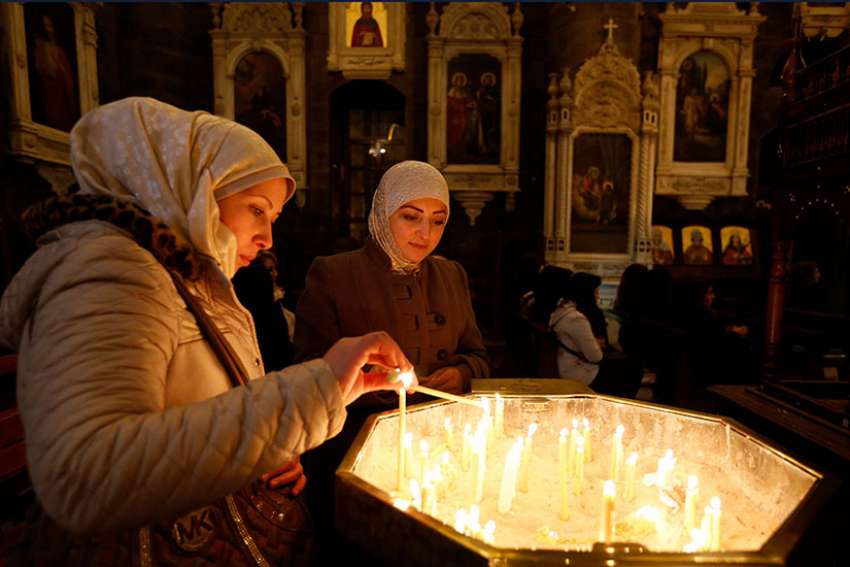Sister Maria Sponsa Iusti Ioseph, a native of Peru, told CNA that the Christians in Aleppo have received with love the words of Pope Francis.
When government forces took the city from rebels in December, the sisters told the faithful “that the Holy Father is praying for us and a lot of people in the world are too.”
“They really appreciate that and they feel protected by the prayers of Christians,” Sister Maria Sponsa said. “At the same time they feel very happy because they know that their suffering is not in vain, but it helps the people in the West. If they know that there are conversions because of that offering, that gives them a lot of strength to go on.”
The sister is a religious of the Institute of the Incarnate Word who lives in the city of Aleppo, which was taken from rebels in December 2016. She recounted how Christians have lived in the last four months.
The Christians in Aleppo attend Mass frequently. Before Mass, they pray a Rosary for peace.
“Once a month a Eucharist is celebrated for the deceased in the Cathedral of the Child Jesus,” Sister Maria Sponsa said. “Now thanks be to God, the Christian cemetery has been recovered—it was controlled by the rebels. Christians can visit their dead again and bring over bodies interred elsewhere for burial there.”
Sister María Sponsa said that the people’s attitude has improved since the government's capture of the city. This change was noticeable during Christmas.
“We saw that people were walking happily down the street. Their faces were completely changed,” she said. “Even though they are usually very cheerful, you could notice another kind of joy. It was like a respite.”
“Some of the window lights were lit up and the churches had also decorated their domes with lights. They even set up a Christmas tree in the street.”
During previous Christmases since the civil war began, “there were no lights in the windows, nor were there churches decorated with lights, nor was there any Christmas atmosphere.”
“When we visited the people we would ask them if they had set up a manger scene, but they didn't want to have one because it brought back memories for them,” Sister Maria Sponsa reported. “Before the war they lived so happily, they shared the holidays with their families. And so it was depressing for them to put out those things that represented those memories in the midst of a difficult situation.”
However, for the 2016 holidays some people put out their decorations again.
The religious sister also stressed that the suffering caused by shortages in the city, such as water, food and shelter, has resulted in Christian and Muslim neighbours working together to survive.
“Today we all share the same lot. Everyone is suffering because of this situation. They help each other out. The people of Aleppo are very respectful and very open, thanks be to God,” she said. “That makes it easier for good relationships among everyone.”
Sister María Sponsa said that the home of the Incarnate Word sisters in Aleppo is open to anyone who wants to visit them.
“People like to come to the house. And so we have little get-togethers, have a little coffee,” she said. “We even have coffee with the people after Sunday Mass. They enjoy it. They talk with us and get a little relief from the situation they're going through.”
For Sister Maria Sponsa, Syrians “express affection very differently from Latinos.”
“It seems to me they're much warmer,” she said. “For example after five minutes they say ‘I miss you.’ When they know you well they call you and ask how you're doing.”
“There, you hardly come into a house and they don’t ask you if you’re going to have coffee. They say, ‘with or without sugar?’ They talk with you for five minutes and then they give you the coffee,” she commented.
The Franciscans and the Salesians usually prepare the Christian children, youths and adults to receive the sacraments for the first time.
The religious sister said that every Thursday the sisters get together with the young college students they welcome into their home.
“We talk, we give them a little doctrine, sometimes we watch movies and play board games,” she said. “For them it’s a time of fun and distraction. They’re always waiting for it to be Thursday so we can get together.”
They also organize a co-ed gathering once a month, since the men live with the priests of the same institute.
“When we can take a little walk, we go to the park, although it's not that safe. We watch movies with them or we invite them.”
The Syrian civil war began in March 2011 with demonstrations against the nation's president, Bashar al-Assad. The war has claimed the lives of more than 320,000 people, and forced 4.8 million to become refugees. Another 8 million Syrians are believed to have been internally displaced by the violence.
(Story from the Catholic News Agency)


